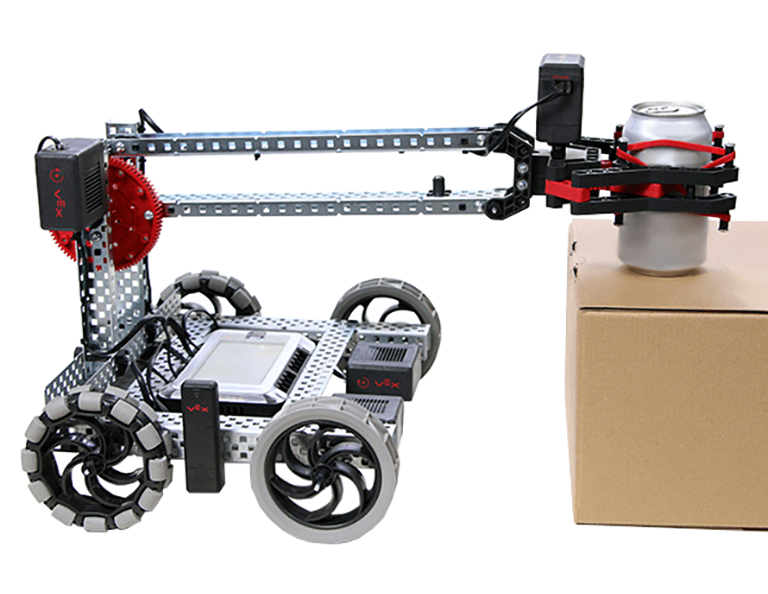Speedy Delivery Preview
- 12-18 years old
- 45 minutes - 5 hours, 45 minutes
- Intermediate

Description
Students are asked to program a robot to navigate a warehouse and to prepare packages for delivery.
Key Concepts
-
Programming
-
Robot Behaviors
-
Iterative Design
Objectives
-
Apply building directions to create a robot to complete a specific task.
-
Decompose problems into smaller components through systematic analysis, using constructs such as procedures, modules, and/or objects.
-
Differentiate between the commands Drive Forward and Drive in Reverse, Turn Left and Turn Right, Arm Up and Arm Down, Open Claw and Close Claw.
-
Utilize the Arm Up and Arm Down, Open Claw and Close Claw commands in an project-based activity.
-
Explain why advances in robotic development is leading to more precise movements.
Materials needed
-
1 or more VEX V5 Classroom Starter Kits
-
Roll of tape
-
12 x 12 foot or 3.66 x 3.66 m open area
-
Optional: VEX Robotics Competition Field Perimeter and Tile kits.
-
Meter stick or Ruler
-
Engineering Notebook
-
Aluminum cans
-
Boxes of various sizes
-
9+ textbooks
-
Stopwatch
-
VEXcode V5
What You'll Need to Know
-
Programming Forward and in Reverse
-
Programming Turning Right and Turning Left
Facilitation Notes
-
Ensure all required parts for the build are available prior to starting this STEM Lab.
-
Make sure that there is ample space in the classroom to measure and tape the layout of the "warehouse" that will be used in the activity. If you have a VRC Field Perimeter and Tile kit, you may set up the Package Dash Challenge using it. If not, tape can be used to outline the measurements.
-
If multiple students will be downloading their saved projects to the same robot, have the students add their initials to the name of the saved project (For example, "Forward and Backward_MW). This way students can find and make adjustments to their projects and not others.
-
An engineering notebook can be as simple as lined paper within a folder or binder. The notebook shown is a more sophisticated example that is available through VEX Robotics.
-
Students can share their pseudocode with the teacher for feedback prior to creating the project for feedback.
-
Students can create and expand on the warehouse floor plan to explore different programming options.
-
The approximate pacing of each section of the Stem Lab is as follows: Seek- 155 minutes, Play- 70 minutes, Apply- 15 minutes, Rethink- 105 minutes, Know- 5 minutes.
Further Your Learning
English/Debate
-
Discuss the pros and cons of robots completing more job related tasks as technology develops.
-
Research and write about other areas where robotic precision is being developed or should be explored.
History
-
Write a paragraph or create a timeline sharing the highlights of industrial robotic development from 1954 until present day.
Educational Standards
Standards for Technological Literacy (STL)
-
1.F
-
6.D
Next Generation Science Standards (NGSS)
-
HS-ETS1-2
Computer Science Teachers Association (CSTA)
-
3A-AP-17
-
3A-AP-21
-
2-AP-19
-
3A-IC-24
Common Core State Standards (CCSS)
-
RST.9-10.2
-
RST.9-10.3
-
MP.5
-
MP.6
TEKS
-
126.40.c.5.A
-
126.40.c.5.B
-
126.40.c.3.A
-
126.40.c.3.B
-
126.40.c.3.F
-
126.40.c.3.G
-
111.39.c.1.C